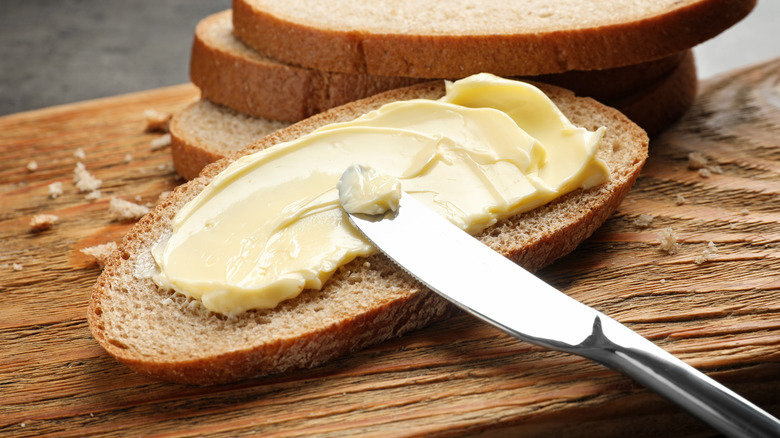Signs That Your Butter Has Gone Bad
How fast do you go through a stick or tub of butter? Well, it all depends. Unless you're someone who cooks or bakes with butter regularly, or uses it to grease cookware, you probably don't know how long that opened butter container has been taking up valuable shelf space in your fridge. Luckily, butter is one of those rare ingredients where its start date (aka the day you opened it) does not dictate its expiration date.
As Can It Go Bad? explains, the lifespan of butter is not comparable to that of other dairy items like milk or cream cheese. In other words, the only hard deadline you need to worry about is the package's best-by date and even that is "pretty conservative." To reiterate, whether you open a new stick of butter today or two weeks from today, its expiration date stays the same. However, that doesn't mean your butter won't spoil. Keep reading to learn how to prolong the life of your butter and how to tell when it's time to toss it out.
Avoid oxidation to prolong your butter's life
Per Can It Go Bad?, there are four ways to tell if your butter has gone bad, the most obvious being mold. If there's mold or discolorations of any kind, toss it out immediately. The next two are fairly straightforward as well: rancid smell and/or taste. Unmelted butter doesn't really have a smell to begin with, so if you're even a little bit concerned about its stench, throw it away. If it smells off, it's likely going to taste off, and the reverse is true as well — if you notice that your butter tastes funky but smells fine, you should still dispose of it.
According to Healthline, butter (especially salted butter) is more likely to go rancid than grow bacteria because it's a high fat ingredient. Fats are very susceptible to oxidation, "which alters their molecular structure and produces potentially harmful compounds." Oxidation is what happens when butter stays at room temperature for too long, especially in exposed heat and sunlight, and it speeds up the spoiling process. This is why you should always keep butter refrigerated when not in use. If you like having soft, spreadable butter on the countertop, it's best to keep out a small amount and replenish it every few days. Finally, always keep butter covered, whether it's in or out of the fridge.

